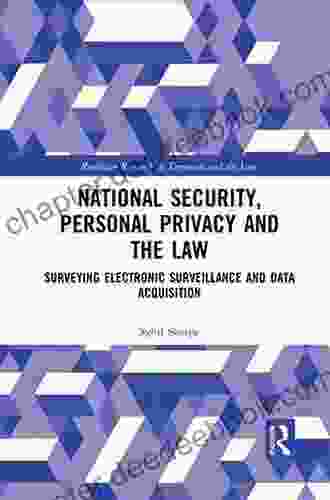National Security, Personal Privacy, and the Law: A Long Tail Exploration

5 out of 5
| Language | : | English |
| File size | : | 849 KB |
| Text-to-Speech | : | Enabled |
| Screen Reader | : | Supported |
| Enhanced typesetting | : | Enabled |
| Print length | : | 144 pages |
The relationship between national security and personal privacy is a complex and often conflicting one. On the one hand, the government has a legitimate interest in protecting its citizens from harm, and this may require the collection and use of personal information. On the other hand, individuals have a fundamental right to privacy, and this right must be balanced against the government's need for information.
The legal framework that governs this relationship is complex and has evolved over time. The Fourth Amendment to the U.S. Constitution protects against unreasonable searches and seizures, and this has been interpreted to include the collection of personal information by the government. However, the government may collect personal information without a warrant if it has a reasonable suspicion that the information is relevant to a national security investigation.
In recent years, the government's use of surveillance technologies has raised new challenges to the balance between national security and personal privacy. These technologies allow the government to collect vast amounts of data about individuals, including their location, communications, and online activities. This data can be used to track individuals' movements, monitor their communications, and build profiles of their behavior.
The use of surveillance technologies has led to concerns about government overreach and the erosion of privacy rights. Critics argue that the government is collecting too much personal information, and that this information is being used to create a surveillance state. They also argue that the government is not ng enough to protect the privacy of its citizens.
The government argues that the use of surveillance technologies is necessary to protect national security. They argue that these technologies allow the government to track down terrorists and other criminals, and to prevent attacks. They also argue that the government is taking steps to protect the privacy of its citizens, and that the use of surveillance technologies is subject to strict legal safeguards.
The debate over the balance between national security and personal privacy is likely to continue for many years to come. As technology advances, the government will gain access to new tools for collecting and using personal information. This will raise new challenges to the balance between these two important interests.
The Fourth Amendment and National Security
The Fourth Amendment to the U.S. Constitution protects against unreasonable searches and seizures. This has been interpreted to include the collection of personal information by the government. However, the government may collect personal information without a warrant if it has a reasonable suspicion that the information is relevant to a national security investigation.
The Supreme Court has ruled that the government's need for national security may justify some limitations on privacy rights. In the case of United States v. United States District Court, the Court upheld the government's use of warrantless wiretaps to investigate suspected terrorists. The Court ruled that the government's need to protect national security outweighed the privacy interests of the individuals who were being surveilled.
However, the Court has also ruled that the government's need for national security cannot justify the wholesale disregard of privacy rights. In the case of Kyllo v. United States, the Court struck down the government's use of thermal imaging technology to scan homes for heat signatures. The Court ruled that the use of this technology was an unreasonable search because it violated the reasonable expectation of privacy that people have in their homes.
The balance between national security and privacy is a difficult one to strike. The government has a legitimate interest in protecting its citizens from harm, but this interest must be balanced against the individual's right to privacy. The Supreme Court has ruled that the government's need for national security may justify some limitations on privacy rights, but it has also ruled that the government cannot disregard privacy rights altogether.
The Government's Use of Surveillance Technologies
In recent years, the government's use of surveillance technologies has raised new challenges to the balance between national security and personal privacy. These technologies allow the government to collect vast amounts of data about individuals, including their location, communications, and online activities. This data can be used to track individuals' movements, monitor their communications, and build profiles of their behavior.
The government argues that the use of surveillance technologies is necessary to protect national security. They argue that these technologies allow the government to track down terrorists and other criminals, and to prevent attacks. They also argue that the government is taking steps to protect the privacy of its citizens, and that the use of surveillance technologies is subject to strict legal safeguards.
Critics argue that the government is collecting too much personal information, and that this information is being used to create a surveillance state. They also argue that the government is not ng enough to protect the privacy of its citizens.
The debate over the government's use of surveillance technologies is likely to continue for many years to come. As technology advances, the government will gain access to new tools for collecting and using personal information. This will raise new challenges to the balance between national security and personal privacy.
The relationship between national security and personal privacy is a complex and evolving one. The government has a legitimate interest in protecting its citizens from harm, but this interest must be balanced against the individual's right to privacy. The Supreme Court has ruled that the government's need for national security may justify some limitations on privacy rights, but it has also ruled that the government cannot disregard privacy rights altogether.
The government's use of surveillance technologies has raised new challenges to the balance between national security and personal privacy. These technologies allow the government to collect vast amounts of data about individuals, and this data can be used to track individuals' movements, monitor their communications, and build profiles of their behavior. The government argues that the use of surveillance technologies is necessary to protect national security, but critics argue that the government is collecting too much personal information and that this information is being used to create a surveillance state.
The debate over the balance between national security and personal privacy is likely to continue for many years to come. As technology advances, the government will gain access to new tools for collecting and using personal information. This will raise new challenges to the balance between these two important interests.
5 out of 5
| Language | : | English |
| File size | : | 849 KB |
| Text-to-Speech | : | Enabled |
| Screen Reader | : | Supported |
| Enhanced typesetting | : | Enabled |
| Print length | : | 144 pages |
Do you want to contribute by writing guest posts on this blog?
Please contact us and send us a resume of previous articles that you have written.
 Book
Book Page
Page Chapter
Chapter Text
Text Story
Story Genre
Genre Reader
Reader Paperback
Paperback E-book
E-book Paragraph
Paragraph Sentence
Sentence Shelf
Shelf Bibliography
Bibliography Preface
Preface Synopsis
Synopsis Footnote
Footnote Manuscript
Manuscript Codex
Codex Tome
Tome Bestseller
Bestseller Memoir
Memoir Reference
Reference Encyclopedia
Encyclopedia Dictionary
Dictionary Thesaurus
Thesaurus Card Catalog
Card Catalog Study
Study Research
Research Scholarly
Scholarly Journals
Journals Reading Room
Reading Room Rare Books
Rare Books Special Collections
Special Collections Literacy
Literacy Study Group
Study Group Thesis
Thesis Dissertation
Dissertation Storytelling
Storytelling Awards
Awards Book Club
Book Club Larissa Reinhart
Larissa Reinhart Esther Jantzen
Esther Jantzen Jamison Roberts
Jamison Roberts Kathy Mann
Kathy Mann Todd Collins
Todd Collins Kate Macleod
Kate Macleod Steve Antinoff
Steve Antinoff Drac Von Stoller
Drac Von Stoller Kimberly Adams
Kimberly Adams David Kipen
David Kipen Diane Eichenbaum
Diane Eichenbaum Rachel Pastan
Rachel Pastan Stephen Hawley Martin
Stephen Hawley Martin Rajdeep Dua
Rajdeep Dua Carl R W Pullein
Carl R W Pullein Vicki Becker
Vicki Becker Robert Higgs
Robert Higgs Denise E Robitaille
Denise E Robitaille Richelle Da Costa
Richelle Da Costa Maggie Dallen
Maggie Dallen
Light bulbAdvertise smarter! Our strategic ad space ensures maximum exposure. Reserve your spot today!

 Marvin HayesThe Beatles for Accordion by Todd Collins: A Journey into the Heart of Fab...
Marvin HayesThe Beatles for Accordion by Todd Collins: A Journey into the Heart of Fab...
 Melvin Blair**Switched Up: DC Super Hero Girls' Unforgettable Adventure into Each Other's...
Melvin Blair**Switched Up: DC Super Hero Girls' Unforgettable Adventure into Each Other's... Greg FosterFollow ·5.1k
Greg FosterFollow ·5.1k John GrishamFollow ·18.9k
John GrishamFollow ·18.9k Reginald CoxFollow ·14.8k
Reginald CoxFollow ·14.8k Dan BrownFollow ·14.3k
Dan BrownFollow ·14.3k Logan CoxFollow ·16.8k
Logan CoxFollow ·16.8k Clinton ReedFollow ·12.5k
Clinton ReedFollow ·12.5k Scott ParkerFollow ·5.4k
Scott ParkerFollow ·5.4k Ted SimmonsFollow ·19.8k
Ted SimmonsFollow ·19.8k

 F. Scott Fitzgerald
F. Scott FitzgeraldRobot Buddies: Search For Snowbot
In the realm of...

 Mario Vargas Llosa
Mario Vargas LlosaUnlocking Academic Success: A Comprehensive Guide to...
In the ever-challenging academic...

 Gabriel Blair
Gabriel BlairMake $000 Per Month Selling Your YouTube Freelancing...
Are you looking for a...
5 out of 5
| Language | : | English |
| File size | : | 849 KB |
| Text-to-Speech | : | Enabled |
| Screen Reader | : | Supported |
| Enhanced typesetting | : | Enabled |
| Print length | : | 144 pages |














